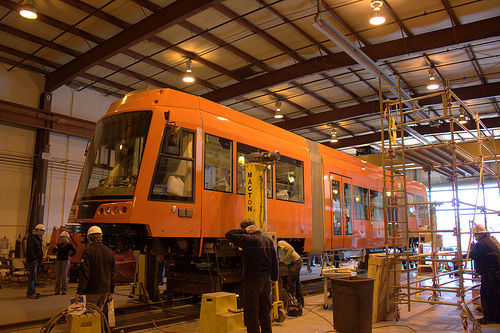With no movement on a highway bill from House T&I Chairman John Mica until after Congress reconvenes in January, Ranking Member Nick Rahall held a press conference today to introduce the “Invest in American Jobs Act of 2011” [PDF]. The act would strengthen the “Buy America” requirements already in place on transit, rail, highway, bridge, and aviation programs.

Among the bill’s stipulations:
- 100 percent of components and subcomponents of transit rolling stock must be made in the US by fiscal year 2016 (currently a 60 percent requirement, to be raised incrementally)
- Amtrak would lose its exemption from Buy America on projects under $1 million
- Any exemptions to Buy America sought will be subject to a period of public comment and must be reported to the Secretary of Transportation
It also seeks to eliminate loopholes for segmented or subcontracted projects like the east span of the San Francisco-Oakland Bay Bridge. Rahall specifically cited the bridge, the largest public works project in California’s history, as having been built using 43,000 tons of Chinese steel—“Made in China, but paid for by American taxpayers.”
The bill is the latest in a growing list of job-creation proposals and counter-proposals to come from either the President or Congress. And like those prior proposals, this one is unlikely to go very far.
Think of it as the Democrats’ answer to “drilling-for-infrastructure” (maybe “regulation-for-protectionism”?). While representatives from the AFL-CIO, United Steel Workers, and United Streetcar threw their support behind the bill at the announcement, a Republican House pushing to de-regulate everything will be unlikely to get behind a Democratic proposal to create additional regulatory burdens – and costs – for industry.
Indeed, it’s easy to read the bill as a mere political maneuver. Rather than letting the Republicans claim credit for introducing a transportation bill they’re overtly touting as a jobs-creator -- and then letting them blame Democrats for refusing to pass it -- the Democrats are trying to get out in front with their own unpassable jobs-and-transportation bill.
The Democrats introducing the bill remained optimistic, however. “The Republicans are now admitting that investing in infrastructure will be the major jobs bill of this Congress,” Rep. Peter DeFazio (D-OR) said. “The question is: where are they going to put the jobs?… They’ll answer it when they see this bill.”
Democrats also indicated that anxiety over the spending in the reauthorization will be assuaged if they can guarantee the money will be spent in the United States, creating American jobs. "When we're talking about doing a transportation bill, the American people have to be convinced that we're actually going to spend this money here in America, to put Americans to work," said Rep. Daniel Lipinski (D-IL). "They cannot believe that we have spent these taxpayer dollars overseas."
Buy America provisions, however, are no boon to the transit sector, which has to pay more for each component it buys. Since transit funding doesn’t increase with these mandates, the result is usually just less transit.
Chandra Brown, President of United Streetcar, was very enthusiastic: “As a businesswoman,” she said, “we need this bill.” Her company has built the first American-made streetcar in almost 60 years, and over 200 of her vendors are making new products as a result. But while the budding domestic transit vehicle industry is certainly excited about this bill, it has yet to be seen how much support it would garner from transit agencies themselves. Only one transit agency in the US—BART in San Francisco—has adopted a Buy America policy, and they did that three days ago. United Streetcar has two clients: Portland, OR, and Tuscon, AZ.
Following the announcement, Rahall was asked whether Committee Chair John Mica had been consulted on this bill, and whether it would ultimately be included in a larger transportation reauthorization effort. Rahall answered that he did not know; that moving ahead as a stand-alone bill is a possibility, but that Mica had been spoken to about Buy America’s inclusion in the reauthorization. His reaction, according to Rahall, was “not negative.”





